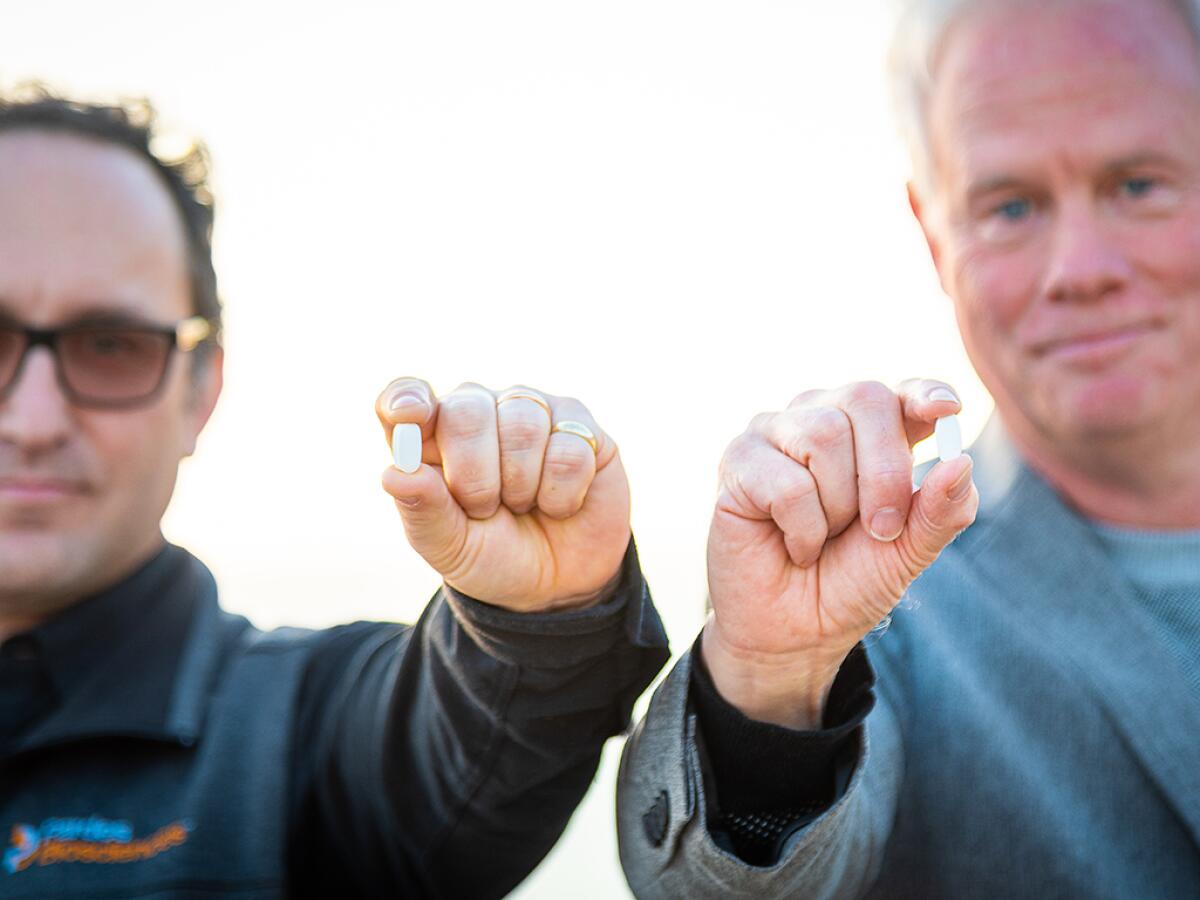Pardes Biosciences nets $199 million to keep pace in COVID-19 pill race

- Share via
Carlsbad startup Pardes Biosciences, which has begun clinical trials for an experimental pill to treat COVID-19, has raised $199 million through a special purpose acquisition company, or SPAC.
Founded in February 2020 specifically to fight the pandemic, the company is pursuing a protease inhibitor antiviral compound called PBI-0451. It aims to offer initial treatment for people with the virus — potentially sidetracking serious illness and keeping them out of overwhelmed hospitals.
“The world needs some sort of pill that you can take at home,” Heidi Henson, Pardes Biosciences’ chief financial officer, said in an interview. “I think the future is moving toward a telehealth system where you have symptoms, you take a home test — which are already available. The results get sent to your doctor and your doctor calls in a prescription that’s delivered to your house, and you never leave. Ideally, you are on medication within 24 hours of diagnosis.”
Pardes Biosciences is a bit of a dark horse in the race for a COVID-19 pill. Pharmaceutical giants Pfizer and Merck last week received emergency-use authorization from federal regulators for pills to treat the virus. Pardes probably wouldn’t apply for emergency authorization until late next year, at the earliest.
Still, Henson contends the race is far from over.
Pfizer’s oral treatment, Paxlovid, also is a protease inhibitor. It reduced the risk of hospitalization and death for mild to moderate COVID-19 patients by 88% in studies. But it needs to be taken along with an oral generic booster drug called ritonavir, which can cause gastrointestinal side effects and potentially interferes with certain existing medications.
Henson said early research suggests Pardes Biosciences’ experimental drug may have the potential to be a stand-alone without requiring a companion booster pill, though it’s too soon to know.
Meanwhile, Merck’s molnupiravir pill, developed with partner Ridgeback Biotherapeutics, uses a different approach, called nucleoside analog, and isn’t allowed for pregnant women or children. It reduced the risk of hospitalization and death by 30% in early studies, according to reports.
Proteases are key to viral growth, and inhibitors block the virus’ ability to set up a replication factory in the body. They have been approved for other illnesses including HIV and hepatitis C.
Pardes Biosciences is currently in a Phase 1 clinical study for its COVID-19 pill. Top-line data are expected in the first quarter of 2022. A potential Phase 2/3 trial could start in the middle of next year.
“We have been able to move very quickly,” Henson said. “We went from basically nothing back in the spring of 2020 to currently we are now in the clinic and toward the end of our Phase 1 study.”
The company employs 28 people, all working remotely. It contracts out lab work for now but plans to set up a footprint in San Diego County. Dr. Uri Lopatin and Lee Arnold founded the company. Lopatin is chief executive and president of the company and Arnold is chief scientific officer.
Pardes Biosciences initially received funding from Foresite Capital Management, Khosla Ventures and GMF Capital. When it sought to raise additional money, it was introduced to a SPAC related to Foresite named FS Development Corp. II.
With a SPAC, a blank-check entity with no business operations goes public with the sole intent of acquiring a company with real operations. Once the merger is complete, the acquired company becomes publicly traded without having to go through the traditional initial public offering process.
“We strongly believe in the potential of oral antiviral therapies and the role they will play in addressing both the current pandemic as well as future global health challenges, and believe Pardes is well-positioned to help lead the industry towards a post-pandemic future,” Jim Tananbaum, CEO of Foresite Capital, said in a statement.
SPACs have been around for years. They have generally been used to take public younger companies that may lack the revenue or other benchmarks usually required for a traditional IPO. They were popular in early 2021, though that allure has waned recently.
Combined with a $75-million private investment in public equity, or PIPE, financing deal that Pardes Biosciences inked in June, total capital available to the company through Monday’s SPAC transaction is $274 million.
The company’s shares trade on the Nasdaq stock exchange under the ticker symbol PRDS. They opened trading Monday at $9.80. On Tuesday, the stock closed at $11.38.
More to Read
Inside the business of entertainment
The Wide Shot brings you news, analysis and insights on everything from streaming wars to production — and what it all means for the future.
You may occasionally receive promotional content from the Los Angeles Times.











